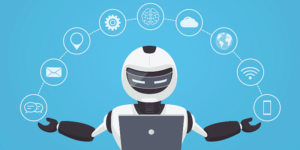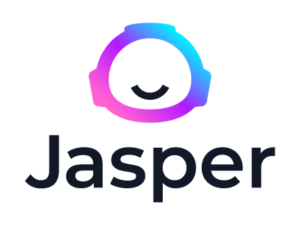AI is used to personalize content, create better customer experiences, and streamline marketing efforts. In this article, we will explore its role in digital marketing, how it transforms the industry, and the opportunities and challenges it presents for businesses looking to stay ahead of the curve.
Find out what is ahead:
- What is Artificial Intelligence, and why is it relevant for Digital Marketing?
- The Impact of AI on Content Creation and Optimization
- Improving Customer Experience with AI-Powered Chatbots and Voice Assistants
- AI’s Role in Influencer Marketing and Social Media Advertising
- Digital Marketing with AI: Opportunities and Challenges
- 3 AI Apps for Digital Marketing
- Einstein GPT for Marketing
- Embracing AI for Enhanced Digital Marketing Success
1. What is Artificial Intelligence, and why is it relevant for Digital Marketing?
Artificial Intelligence is the simulation of human intelligence, replicating natural language processing, expert systems, speech recognition and machine vision.
AI technology uses algorithms and machine learning to analyze data, identify patterns, and make predictions – and it could be in real-time. This makes it a valuable tool for digital marketers who want to gain insights into their target audiences and create campaigns that resonate with customers on a deeper level.

AI-powered tools enable marketers to monitor customers’ online behaviour effectively, gain insights into their preferences, and make real-time predictions about their needs. By efficiently collecting and analyzing customer data, digital marketers can create highly targeted campaigns that establish a personal connection with customers, thereby increasing the chances of brand engagement.
Also, AI assists marketers in developing specific customer personas by examining data from multiple sources such as social media, search engines, and website analytics. This approach empowers marketers to craft campaigns that cater to specific customer segments, ultimately enhancing engagement and conversion rates.
2. The Impact of AI on Content Creation and Optimization
AI can assist marketers in creating content that is optimized for search engines and social media. With its tools, marketers can analyze search engine data and social media trends to identify the keywords and topics most likely to resonate with their target audience, creating engaging, relevant and optimized content and helping marketers optimize their existing content for better results.
Marketers can analyze their content’s performance and identify improvement opportunities, such as headlines, images, and even the tone of voice used to determine what resonates best with the audience.
3. Improving Customer Experience with AI-Powered Chatbots and Voice Assistants
AI-powered chatbots and voice assistants provide real-time customer interaction. In contrast, chatbots handle queries on websites and messaging apps, and voice assistants offer information and perform tasks using natural language.
These tools enhance customer experiences by delivering quick and helpful responses, increasing satisfaction and resource allocation for strategic initiatives. Chatbots and voice assistants will learn from interactions, continuously improving future experiences.
Predictive analytics with AI empowers digital marketers, leveraging data, algorithms, and machine learning to predict future outcomes. By combining machine learning with predictive analytics, marketers accurately target audiences with precision.
4. AI’s Role in Influencer Marketing and Social Media Advertising
Influencer marketing has exploded in recent years, but it can be challenging to identify the right influencers for your brand and target audience. AI tools, however, can help automate this process by analyzing influencer data, such as engagement rates, audience demographics, and content themes, to identify the most relevant and effective influencers for your brand.
The influencer marketing topic brings us to social media advertising, another area where AI makes a considerable impact, analyzing vast amounts of social media data, including user behaviour, interests, and preferences, to create highly targeted ad campaigns. Marketers can use it to target specific audiences to increase engagement rates, reduce ad spend, and maximize ROI.
5. Digital Marketing with AI: Opportunities and Challenges
The future of digital marketing with AI is vast and exciting. Emerging trends, such as natural language processing, image recognition, and predictive personalization, offer new opportunities for marketers to create more personalized and engaging campaigns that resonate with audiences. However, these trends pose unique challenges, such as protecting consumer privacy and addressing ethical concerns.
Implementing AI in digital marketing can also be challenging, particularly for smaller businesses with limited resources or technical expertise. However, as it becomes more accessible and user-friendly, these barriers are becoming easier to overcome.
6. 3 AI Apps for Digital Marketing
To finish this article, we wanted to give you some of the best tools to help you:
1. Jasper is best used as a writing assistant to help you create content that ranks for SEO and enables you to finish your writing process faster with a better copy.
Best features:
- Content creation
- The tone of voice settings
- Plagiarism checker
- Grammarly Integration

2. WriteSonic is best for SEO-optimized content and your social media posts. It can produce short and long-form content depending on which plan you choose.
Best features:
- Content creation for social media, ads, emails and website
- Content ideas and content library
- Collaboration tools

3. Anyword is best for generative performance writing. You can connect your website, social media, email and ad channels to Anyword to know your audience and what you’ve tried in the past – what worked and what didn’t.
Best features:
- Copy intelligence
- Custom keywords
- Email and SMS optimization
- Brand voice

7. Einstein GPT for Marketing
Besides these apps, with Einstein GPT, brought into the Salesforce platform, marketers can get tasks done faster.
Einstein GPT is a cutting-edge artificial intelligence (AI) technology developed by Salesforce and the world’s first AI CRM-generating technology. It uses AI to create content for all sales, service, marketing, commerce and IT interactions.
See how Einstein GPT can be a game-changer for your company below.
https://www.youtube.com/watch?v=YAsKRxXdyj0&ab_channel=Salesforce
8. Embracing AI for Enhanced Digital Marketing Success
To get the most out of this technology in digital marketing, it’s essential to focus on finding the right tools and strategies that work best for your business needs. Whether using predictive analytics to gain insights into consumer behaviour or leveraging AI in influencer marketing and social media advertising, the key is approaching it with a clear understanding of your goals and how it can help you achieve them.
Artificial Intelligence has become an indispensable tool for businesses looking to succeed in the digital marketing landscape. Its applications in marketing are virtually limitless, from customer targeting and personalization to content creation and beyond. While challenges still exist in integrating AI into digital marketing strategies, the benefits are undeniable. As this technology advances, companies must stay ahead of the curve and embrace AI to maximize their marketing potential and remain competitive.
And to conclude, this article on AI was written with the assistance of an intelligent language model. That’s right! But while AI may have played a role in its creation and given me interesting insights, the essence of human curiosity and human skills still shines through.
If you’re interested in AI-related topics, check out our Analytics & AI category for many more articles. And subscribe to our Knowledge Center to never miss an update!







